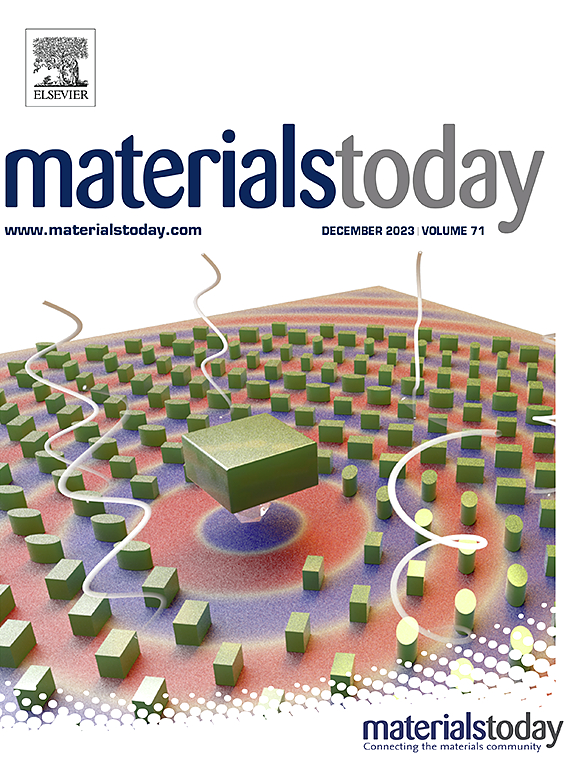A dispersed buffer phase enables mitigated stress toward stable 4.6 V Graphite||NCM811 batteries
IF 22
1区 材料科学
Q1 MATERIALS SCIENCE, MULTIDISCIPLINARY
引用次数: 0
Abstract
High-voltage Ni-rich cathodes, which show high energy density and large cost-effectiveness, hold great promise for power Li-ion batteries. However, the unstable cyclic structure rooted in stress restricts their practical applications. In this work, we propose a strategy using a dispersed Eu2O3 buffer phase to mitigate the high-voltage cyclic stress. The optimized Ni-rich cathode shows excellent high-voltage thermal stability and practical long-term cycling stability. For the constructed 4.6 V full cell, a superior capacity retention of 92 % after 200 cycles is observed. The enhanced cyclic properties are ascribed to the mitigated stress, as revealed by multi-characterizations such as in-situ X-ray diffractions and finite element simulation. As expected, the mitigated stress well stabilizes the oxygen lattice and preserves the particle structures. More importantly, the approach is confirmed to be versatile in other high-voltage cathodes. Also, other available elements including La and Dy for the construction of buffer phases are outlooked.

分散的缓冲相可以减轻对稳定4.6 V石墨||NCM811电池的应力
高压富镍阴极具有高能量密度和高成本效益,在动力锂离子电池中具有广阔的应用前景。但应力引起的不稳定循环结构限制了其实际应用。在这项工作中,我们提出了一种使用分散的Eu2O3缓冲相来减轻高压循环应力的策略。优化后的富镍阴极具有优异的高压热稳定性和实用的长期循环稳定性。对于构建的4.6 V充满电池,在200次循环后观察到92%的优越容量保留。原位x射线衍射和有限元模拟等多种表征结果表明,循环性能的增强归因于应力的减弱。正如预期的那样,减轻的应力很好地稳定了氧晶格并保留了粒子结构。更重要的是,该方法被证实在其他高压阴极中是通用的。此外,还展望了其他可用于构建缓冲相的元素,包括La和Dy。
本文章由计算机程序翻译,如有差异,请以英文原文为准。
求助全文
约1分钟内获得全文
求助全文
来源期刊

Materials Today
工程技术-材料科学:综合
CiteScore
36.30
自引率
1.20%
发文量
237
审稿时长
23 days
期刊介绍:
Materials Today is the leading journal in the Materials Today family, focusing on the latest and most impactful work in the materials science community. With a reputation for excellence in news and reviews, the journal has now expanded its coverage to include original research and aims to be at the forefront of the field.
We welcome comprehensive articles, short communications, and review articles from established leaders in the rapidly evolving fields of materials science and related disciplines. We strive to provide authors with rigorous peer review, fast publication, and maximum exposure for their work. While we only accept the most significant manuscripts, our speedy evaluation process ensures that there are no unnecessary publication delays.
 求助内容:
求助内容: 应助结果提醒方式:
应助结果提醒方式:


